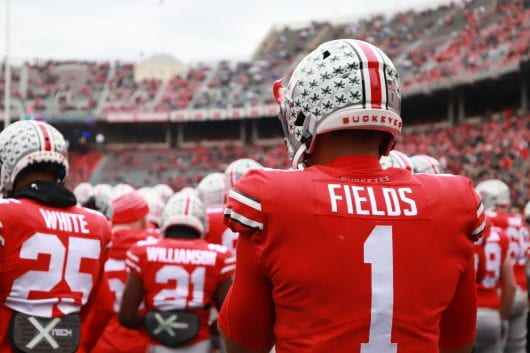
Ohio State sophomore quarterback Justin Fields (1) takes the field in the game against Penn State on Nov. 23. Ohio State won 28-17. Credit: Cori Wade | Assistant Photo Editor
Collegiate student-athletes are one step closer to profiting from their name, image and likeness, as the NCAA announced Wednesday that new rules for third-party compensation are expected to take effect at the start of the 2021-22 academic year.
The NCAA Board of Governors supported rule changes in a meeting this week that would allow players to make money from endorsements related to and separate from athletics, as well as social media opportunities and personal appearances, according to a release from the NCAA.
“Throughout our efforts to enhance support for college athletes, the NCAA has relied upon considerable feedback from and the engagement of our members, including numerous student-athletes, from all three divisions,” Ohio State President and chair of the board Michael V. Drake said in the release. “Allowing promotions and third-party endorsements is uncharted territory.”
Despite the changes, the NCAA will maintain guardrails surrounding the new rules. Student-athletes will not be allowed to use their conference and school logos or other trademarks, and schools and boosters will be barred from paying student-athletes to play or using their name, image and likeness for recruiting. Agents and advisers will also be regulated, according to the release.
Following the board’s recommendation, rules will be structured further in the NCAA’s three divisions. Rules changes will follow a set of guidelines that the board established in October, including maintaining the priorities of education, distinguishing collegiate and professional opportunities and ensuring student-athletes receive similar treatment to nonathlete students “unless a compelling reason exists to differentiate,” according to the release.
“The NCAA’s work to modernize name, image and likeness continues, and we plan to make these important changes on the original timeline, no later than January 2021,” Ohio State athletic director and working group co-chair Gene Smith said in the release. “The board’s decision today provides further guidance to each division as they create and adopt appropriate rules changes.”
Drake said the NCAA will continue to work with Congress throughout the process of modernizing its rules.


